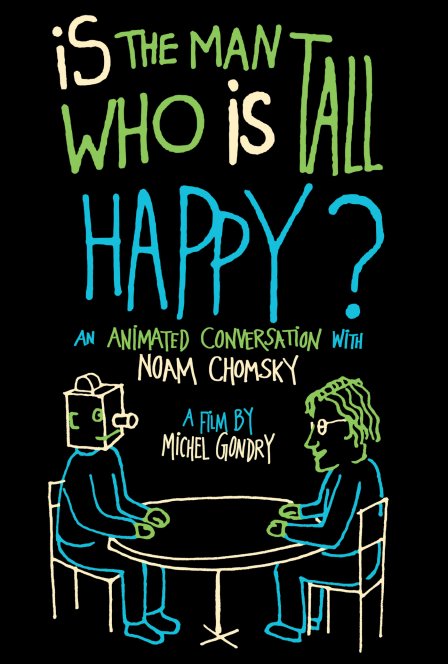Reviewing Is The Man Who Is Tall Happy? is a problem. It is a recorded conversation between Michel Gondry (filmmaker) and Noam Chomsky (linguist), visualized through animations by Gondry and bits of footage of Chomsky speaking. The first question that comes to mind is, (a) do you review the film or the conversation, and, for that matter, (b) are they different? Then, (c) how does one review a conversation, anyway, and (d) in what ways does a conversation differ from a narrative, besides?
(a) I don’t know; the film itself is unmoving and concrete, and in that way, uninteresting. The conversation, however, spreads like roots to everyone that hears it, clearly meant not as a definitive statement and more of a seed. In some sense, many pieces of art seem worth something even without an audience; in this case, that is clearly untrue.
(b) I think so. Gondry’s animations are his interpretations of what Chomsky is saying, which is already something that is at least several times removed from the original conversation: through time, his own contextualization (experiences up to this point, emotional dispositions, etc.), and his own evolving interpretations and understanding or forgetting. Besides, the conversation itself has been edited to fit inside this film, and so its content can only be reviewed as manipulation. Its content has been compromised, for sure.
(c) Typically, one doesn’t. But there is certainly some merit to it — or, at least, I think there is, insofar as there’s any merit in reviewing anything — even if there isn’t a standard to which we should be comparing a conversation. And in this case, Gondry doesn’t feel capable of parsing either Chomsky’s intellectual/philosophical wanderings or his biography; neither one is explored in sufficient detail, and it all skitters around swiftly from one topic to another and then another and then back to the first. It is unsatisfying, but nonetheless intriguing; it lacks censorship in its curiosity, similar to Chomsky himself. But this, too, doesn’t feel like enough, here — reviewing a conversation is much deeper, I think. More later.
(d) A good conversation? None, maybe. Isn’t that what art is — an interrogation of ideas through a digestible narrative? People talking? My Dinner With Andre was just a conversation, albeit a scripted one. Does it matter? Probably, yeah — because something planned can have an interesting arc, and something that is unplanned is just improv, and maybe it’ll work, maybe it won’t. But the question of the difference — is there one? I don’t think so.
It still leaves me puzzled, as I don’t know how to break down the characters of Gondry and Chomsky. Clearly, Is The Man Who Is Tall Happy? does not have enough personal anecdotes from Chomsky to make him interesting or deep; in short, I still have no reason to care about him, and cannot relate to him. And Gondry does little to question Chomsky’s ideas, positions, and stories. This is a monologue far more than a dialogue, especially considering that Gondry’s asides are inserted after the fact, recorded alone.
The film is interesting, but the conversation (seen here in its mangled form) is more interesting. Or maybe it’s vice-versa — maybe I only think the conversation itself is more interesting because of what’s presented to me here, and my imagination of what I’m not seeing. Gondry’s animations are beautiful and psychedelic, like margin doodles freed from their narrow cells. Chomsky wanders where Gondry thoughtlessly leads. They are not equals and they both know it. Reviewing their conversation is not like reviewing My Dinner With Andre, which was the radical concept of taking the mundane and everyday and being purposeful with it. Is The Man Who Is Tall Happy? seems much more like taking the mundane and the everyday — especially for Chomsky, who gets to hear himself talk like this without end — and simply recording and regurgitating it: worth listening to more than most conversations you could overhear, but still objectiveless and aimless, pointless in its purposelessness, an act of incidental eavesdropping nonetheless.

